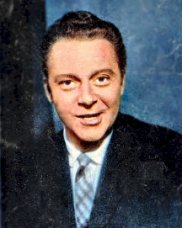
George Putnam, as seen on cover of April 21-27, 1956 issue of TV-Radio Life
Thursday, January 23, 2003
Page 14
REMINISCING (Column)
George Putnam: Superstar of Local Television
By ROGER M. GRACE
No one in the history of Los Angeles television had the clout that George Putnam did. He toppled a mayor —Norris Poulson—even though he was working for a station owned by the Times-Mirror Company, whose two daily newspapers were backing the incumbent.
During the primary in 1961, Putnam was pulling for either Sam Yorty, a former assemblyman and congressman, or Pat McGee, a member of the City Council and former assemblyman. McGee was given a bit of airtime on Putnam’s show (taking less than was offered); Yorty appeared, night after night, to deliver a pitch. After Yorty got in the run-off with Poulson, Putnam was his on-air champion. In essence, he crowned him.
|
|
George Putnam, as seen on cover of April 21-27, 1956 issue of TV-Radio Life |
Putnam (attired in his suit from sponsor Bond Clothing, for which he delivered spiels) would end his 15-minute 6:45 p.m. newscast/commentary by intoning, theatrically:
“And that’s the up-to-the-minute news; up to the minute, that’s all the news. [Extending his right arm backward toward the American flag:] Here’s to a better, stronger America. See you at 10, [saluting the audience] see you then.”
I remember once during the 1961 election that he varied the sign-off, booming, “Here’s to a better, stronger America—and a cleaner Los Angeles, California!”
Here was a reporter who openly eschewed objectivity.
Can you imagine a TV anchor nowadays being allowed to make an endorsement in the race for district attorney? When appointed D.A. William B. McKesson sought election to a full term in 1956, Putnam told viewers:
“Many of you have asked where I stand in the race for Los Angeles district attorney. I stand for Los Angeles District Attorney William B. McKesson.”
And he then ticked off his reasons.
Putnam was accorded extraordinary latitude. His immense popularity apparently caused Times-Mirror to shut its eyes to the fact that on Putnam’s show, the line between news reporting and propagandizing was thin, if it existed at all.
And yet, it wasn’t easy for Putnam to get on the air in Los Angeles.
He had been a broadcaster since 1934. His first job, which he landed his 20th birthday (July 19), was at a 1,000-watt radio station in Minneapolis, Minn.
(The fictional Ted Baxter of the “Mary Tyler Moore Show”—patterned partially after Putnam and inspired also by the late Jerry Dunphy—recounted often his start at a 1,000-watt radio station. Baxter worked at WJM, a TV station in Minneapolis, but began at a radio station in California; Putnam began in Minneapolis radio but wound up on television in California.)
Putnam first appeared on television in 1939, back in the medium’s experimental era. But primarily, Putnam was a radio newscaster in his early days—on NBC, on the Mutual Broadcasting System, and even the BBC. Walter Winchell once wrote in his “colyum”: “George Putnam’s voice is the greatest in radio.” Putnam has credited that plug with having made his career.
The newscaster landed a job with the Du Mont television network in about 1948, writing and delivering six commentaries a week on half-hour shows emanating from New York.
Clearly, he was going places—but then was stopped in his tracks.
“Putnam himself lapped up the excitement of it all to the extent of winding up heavily in debt and embroiled in an unfortunate marriage,” an article in the May 28, 1954 issue of TV Guide recounted. “Before he quite knew what had happened, he found himself not only out of a job but all doors closed to him.”
Virtually penniless, he got in his car, drove to Los Angeles, and went from station to station looking for work. As TV Guide told it:
“Finally, late in 1951, KTTV came up with an opening and Putnam talked his way into it. He’s been there ever since, the highest-rated newsman in Los Angeles and happy as a hard-hitting rookie at batting practice.”
Throughout the 1950s, Putnam was L.A.’s “celebrity” newscaster.
A TV Guide article in 1955 reported that a network almost snatched Putnam from KTTV, but that the station was able to keep him after it “came through with a considerably revised contract.”
More about G.P. next week.
Copyright 2003, Metropolitan News Company